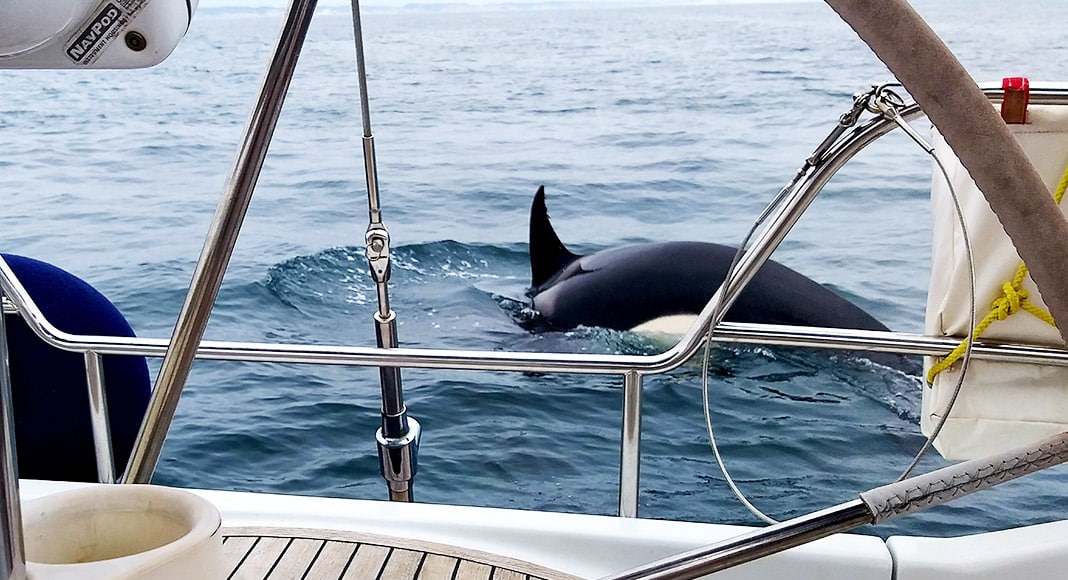Orcas have been responsible for dozens of attacks to saling boats, including two sinkings
A new acoustic device to deter orcas from interacting and endangering recreational sailboats will be tested this summer along the Portuguese coast, at a time when many sailors are already avoiding national waters.
“Some lines of development of acoustic deterrents are being developed and will be tested this summer, in order to try to find options to protect sailboats and minimise the number of interactions,” António Bessa de Carvalho, president of the National Cruise Association (ANC), has told Lusa.
The Portuguese Navy, the Institute of Nature Conservation and Forests (ICNF) and the ANC have held meetings since March to try to find a solution to these incidents, all of them involving sailboats under 15 metres – and which have already led to the sinking of at least two vessels.
The first cases of interactions along the coast here were recorded in 2020, when some younger orcas began what authorities like to call “interacting with vessels”, mainly sailboats, although there have also been some incidents involving fishing and pneumatic boats.
“The owners of sailboats are very concerned and at the moment they are afraid to take their boats to the Algarve, as they do every year,” admits Bessa de Carvalho.
The cruising association president admitted many foreign sailors now “avoid Portuguese waters” and, when coming from the north of Europe, go directly to Madeira and the Canaries.
“We hope that this joint work will be fruitful and will manage to develop a device that will protect the vessels and the group of orcas,” he explained.
According to the Atlantic Orca Working Group (GTOA) website, since the beginning of the year, there have been several dozen “interactions with physical contact” of boats with orcas – the majority of them along the coast of Andalusia (Spain) that runs from Cadiz to the Gibraltar straits.
In Portugal, there were, during the same period, six of these “interactions with physical contact”, all several miles off the coast: one off Peniche, three off Cape Espichel, one off Melides and three south of Faro.
These animals are mainly attracted to the rudder of the boats and, in a number of cases, the interactions have caused serious damage that has prevented the boats from sailing.
“It is still not known why the orcas have interacted with boats. What we know is that they have interacted mainly with the rudders, being a relatively fragile structure in these vessels,” explained marine biologist Rui Peres dos Santos.
Most recently, there has come a theory that this behaviour has been triggered by a traumatic experience suffered by a female, nicknamed by scientists as “White Gladis”.
Questioned by Lusa on whether these interactions may represent some risk to bathers, Rui Peres dos Santos said that, up until now, there has been no record of any interaction with people in the water, either swimming near the boats or on the beach.
These animals are cetaceans of the dolphin family, feeding mainly on Atlantic bluefin tuna.
Although they have teeth, according to GTOA, they never eat cetaceans or other marine mammals.
Rui Santos Pereira, commander of the Southern Maritime Zone, stresses there is no “direct” danger to people” – the only concerns being that these interactions could bring further damage, and further potential boat sinkings (which could put people at risk).
According to reports quoted by GTOA, the orcas have “touched, pushed and even turned” boats, adding clearly to the feelings of fright experienced by sailors/ crew.
According to information from various entities, in the event of a sighting of orcas, boats should, if possible, slow down and stop their engines, “stop putting pressure on the rudder (leave it loose) and wait for the animals to move away”.
This advice however did not help the crew of the Smousse, in November last year, who claim to have done everything in the book, to no avail.
The Iberian orca is a subpopulation of orcas that live in the north-east Atlantic, usually ranging from the west coast of Galicia (Spain) to the Strait of Gibraltar, which includes the entire Portuguese coast.
The length of adult Iberian orcas is between five and six metres – a small size compared to other orcas, such as Antarctic orcas which are up to nine metres long.
Source material: LUSA


























